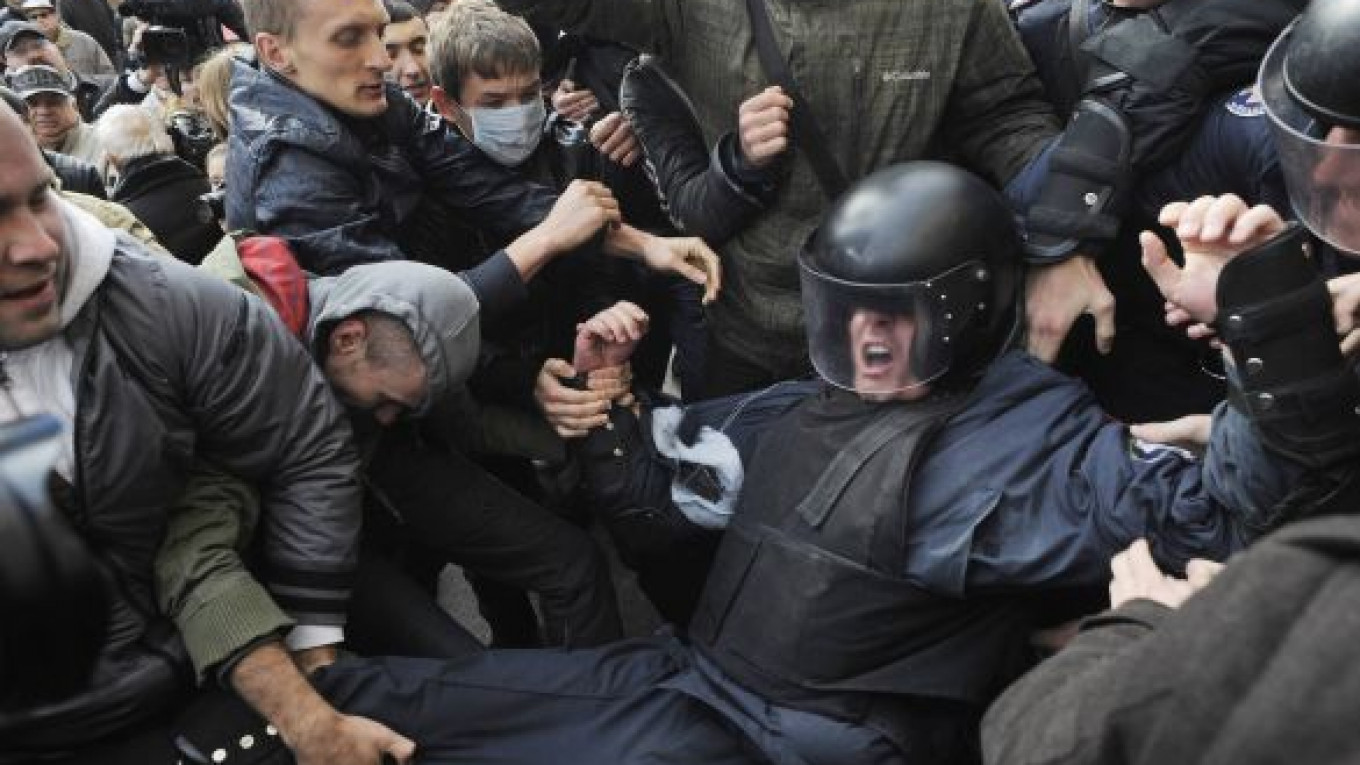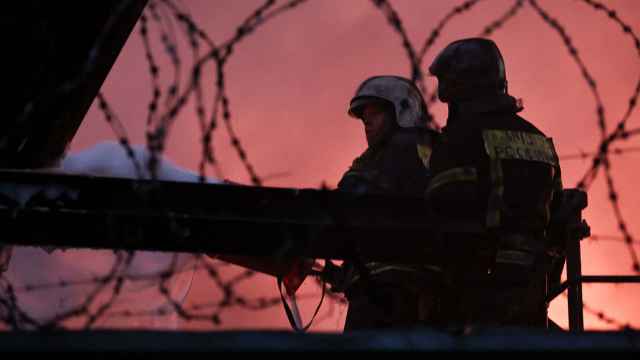BRUSSELS — When Russia wants to get its point across, it tends to leave no room for misunderstanding.
Put out by Europe's efforts to build closer relations with six countries in Eastern Europe and the Caucasus, former Soviet republics that Russia regards as in its sphere of influence, Moscow has been steadily turning up the heat.
Armenia was the first to cave, turning its back on an association agreement with the European Union and agreeing instead to join Russia's customs union, a trade zone with Belarus and Kazakhstan launched in 2010.
Moscow has also homed in on defense or trade vulnerabilities in Georgia, Moldova and Azerbaijan, although the first two remain likely to move ahead with closer EU ties at a special summit in Vilnius in late November. Belarus, despite friction with Moscow, remains firmly in Russia's camp for now.
The big question is Ukraine, economically and politically the most important of the partnership countries. Despite pressure on trade, including key gas supplies from Russia, which sees Ukraine as culturally its own, Kiev is determined to look West and seal closer links to Europe next month.
That is not what Moscow wants to hear or accept.
"What we have seen during the past few weeks is brutal Russian pressure against the partnership countries of a sort that we haven't seen in Europe for a very long time," said Sweden's Foreign Minister Carl Bildt last month, describing Moscow's actions as "economic warfare."
Russia has said it is merely protecting its interests. "Russia is in no way trying to infringe on anyone's sovereign right to make decisions about their international activity," President Vladimir Putin said in September.
Nearly all the partnership countries do the vast majority of their trade with Russia and rely on it for gas. Moscow is concerned about a flood of European goods entering the country if Kiev signs a free trade agreement with the EU.
Trade is particularly sensitive: Russia was Ukraine's biggest trading partner but not any longer. Now it is the EU, with 27 percent of Ukraine's exports and 34 percent of its imports, and the volume growing by double-digits annually.
Russia is also wary of the EU's broader agenda. Drawing in countries in the region could over time help Europe secure a degree of influence over vital gas and oil supply routes towards the West at the expense of Russia's dominance.
As a result, Putin has threatened to impose punitive tariffs and other restrictions on imports via Ukraine if it goes ahead with the EU agreement.
"We would somehow have to stand by our market, introduce protectionist measures," Putin said last month. "We are saying this openly in advance."
As if to underline the message, Russia has taken steps against Lithuania, an EU member state that currently holds the union's presidency, imposing extra customs checks on Lithuanian trucks and causing heavy losses for Lithuania's large trucking industry.
Tymoshenko
With nearly 46 million people and a $330 billion economy, Ukraine is easily the biggest prize among the Eastern Partnership states. But Europe cannot afford to compromise on justice and human rights solely to pull one country closer into its orbit, no matter how strategically important it may be.
Ukraine has to carry out a range of judicial, electoral and business reforms to secure the Association Agreement, as well as finding a solution to the case of Yulia Tymoshenko, the former prime minister now imprisoned for abuse of power following a 2011 trial that the EU said was based on selective justice.
EU officials are satisfied with the progress made on reforms and expect all of the 'benchmarks' to have been met by the Vilnius summit on Nov. 28 to 29. But Tymoshenko is a much more intractable problem with no clear solution.
Germany has said it wants the former prime minister, who is receiving treatment for back problems while under guard in hospital, to be released or at least allowed to travel abroad for treatment before it can back the Association Agreement.
That position is broadly supported by Britain, France, the Netherlands and the Nordic countries, while several east European member states are more flexible on what the terms of any deal on Tymoshenko should be.
Ukraine says it is not possible to release Tymoshenko unconditionally as it would violate the law, an argument officials in Brussels acknowledge has some truth.
The hope was that an agreement could be reached by Oct. 21, when EU foreign ministers will hold a regular monthly meeting. But EU officials are not convinced that the date will hold. They are also not sure a deal can be clinched by the meeting after that on Nov. 18 — just 10 days before the Eastern Partnership summit.
Asked if Tymoshenko might still be in custody in Ukraine on Nov. 29, when Kiev should be signing the Association Agreement, two EU officials involved in trying to resolve the dispute acknowledged that this might be the case.
"But she may not still be there in early December," one of them said, hinting at the possibility of a compromise that involves her leaving the country soon after the summit.
Repercussions
From the EU's point of view, Ukraine is an opportunity that cannot be missed: Kiev wants closer association and if Europe does not act now, it may well lose it to Russia and the customs union forever.
The failure to draw in Ukraine would likely diminish the EU's sway over other countries covered by the Eastern Partnership policy, undermining its goals of spurring democratic reforms in the region and safeguarding political stability.
"We cannot accept any attempt to limit these countries' own sovereign choices," European Commission President Jose Manuel Barroso told the European Parliament in his annual address last month. "We cannot turn our back on them."
The hope in Europe is that opening trade routes will improve cooperation on other issues such as security and, over time, demonstrate the benefits of democratic governance.
In the near-term, Europe needs help in addressing crime with countries such as Moldova located on important trafficking routes toward the EU. In the Caucasus, territorial disputes such as that between Armenia and Azerbaijan could hurt Europe's energy aims and pull it into conflict with Russia.
"The fundamental interest in the Eastern Partnership is to have a zone of stability to the east of the EU and not be faced with state failure ... in which case there could be spillover into the EU,' said Michael Leigh, a senior adviser with the General Marshall Fund in Brussels.
Pay the Price
But for all its planning, Europe also knows that retribution, in the shape of an energy squeeze, is likely from Russia.
Moscow, which has a long-standing disagreement with Ukraine over gas, has said it would raise Ukraine's gas prices, and officials do not rule out it doing the same for the EU, which gets nearly 40 percent of its gas from Russia.
Moscow has in the past, during disputes with Ukraine, cut off the flow to EU member states, several of which are entirely dependent on Russia's supplies, and could do so again.
"We would not be surprised if they played the gas card, it is among the factors we are taking into account," said the EU official involved in the Ukraine negotiations.
Knowing the immediate retaliatory impact of the Association Agreement will be felt first in Ukraine, where living standards are well below the EU average, Brussels is ready to take steps to support the country. These include allowing the free trade benefits to kick in immediately, rather than Kiev having to wait until all 28 EU members have ratified the agreement.
For Ukraine, with its economy based on steel, chemicals and agricultural products, free trade with a bloc of 500 million European consumers and businesses is a huge boon.
A Message from The Moscow Times:
Dear readers,
We are facing unprecedented challenges. Russia's Prosecutor General's Office has designated The Moscow Times as an "undesirable" organization, criminalizing our work and putting our staff at risk of prosecution. This follows our earlier unjust labeling as a "foreign agent."
These actions are direct attempts to silence independent journalism in Russia. The authorities claim our work "discredits the decisions of the Russian leadership." We see things differently: we strive to provide accurate, unbiased reporting on Russia.
We, the journalists of The Moscow Times, refuse to be silenced. But to continue our work, we need your help.
Your support, no matter how small, makes a world of difference. If you can, please support us monthly starting from just $2. It's quick to set up, and every contribution makes a significant impact.
By supporting The Moscow Times, you're defending open, independent journalism in the face of repression. Thank you for standing with us.
Remind me later.






